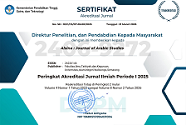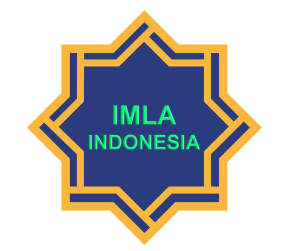Optimizing Arabic Listening Skills: A Systematic Review and the Proposal of an Integrated Sug-gestopedic Brain-Based Learning (ISBBL) Model
Abstract
Proficiency in Arabic listening skills (maharah istima') is foundational for language acquisition, yet learners often face significant psychological barriers, such as foreign language anxiety, which traditional pedagogical methods may fail to adequately address. While humanistic approaches like Suggestopedia aim to lower affective filters, a systematic framework that grounds its techniques in modern neuroscience is needed. This study aims to bridge this gap by developing a coherent pedagogical framework that integrates the affective strategies of Georgi Lozanov's Suggestopedia with the neuroscientific principles of Brain-Based Learning (BBL). A Systematic Literature Review (SLR) was conducted following PRISMA guidelines. A comprehensive search of academic databases for literature on Suggestopedia, BBL, neurolinguistics, and listening comprehension acquisition was performed, followed by a rigorous screening and thematic analysis process to synthesize the findings. The analysis revealed profound synergies between Suggestopedia's techniques (e.g., positive suggestion, concert sessions, peripheral learning) and BBL's core principles (e.g., relaxed alertness, orchestrated immersion, emotional engagement). The synthesis demonstrates that Suggestopedia can be conceptualized as an intuitive precursor to BBL. The primary outcome of this synthesis is the formulation of the Integrated Suggestopedic Brain-Based Learning (ISBBL) model—a novel, five-phase cyclical framework (Affective Priming, Thematic Immersion, Active Concert, Passive Concert, and Playful Activation) designed to systematically guide learners from high anxiety to a state of relaxed, active engagement. The proposed ISBBL model provides educators with a practical, evidence-based framework that operationalizes the integration of Suggestopedia and BBL. By grounding Suggestopedia's intuitive methods in educational neuroscience, this model offers a novel and structured approach to overcoming affective barriers and enhancing the effectiveness of Arabic listening instruction. Further empirical research is recommended to validate the model's efficacy in classroom settings.
Downloads
References
Abidin, S R Z, S F M Noor, and N S Ashaari. “Serious Game Concep-tual Model of Brain-Based Learning for Halus Student.” Per-tanika Journal of Science and Technology 29, no. 4 (2021): 3161–85. https://doi.org/10.47836/PJST.29.4.49.
Agung, Nur. “Peningkatan Kemampuan Debat Bahasa Arab Maha-siswa Melalui Metode Suggestopedia.” Naskhi: Jurnal Kajian Pendidikan Dan Bahasa Arab 2, no. 1 (2020). https://journal.uiad.ac.id/index.php/naskhi/article/view/288/203.
Akalin, Suna. “The Discourse in Mrs. Dalloway by Virginia Woolf and Foreign Language Teaching: The Decline of Language Learner Anxiety by the Usage of Hedges, Particular Modals and Adverbs as in the Usage of These Structures in Mrs. Dalloway for a Specific Purpose.” Procedia - Social and Be-havioral Sciences 174 (February 2015): 3049–54. https://doi.org/10.1016/j.sbspro.2015.01.1097.
Alanazi, F H. “Brain-Based Learning as Perceived by Saudi Teachers and Its Effect on Chemistry Achievement of 7th Graders.” Journal of Baltic Science Education 19, no. 6 (2020): 864–74. https://doi.org/10.33225/jbse/20.19.864.
Alavi, Sayyed Mohammad, and Fatemeh Esmaeilifard. “The Effect of Emotional Scaffolding on Language Achievement and Willingness to Communicate by Providing Recast.” Cogent Psychology 8, no. 1 (December 31, 2021). https://doi.org/10.1080/23311908.2021.1911093.
Al-Balushi, K A, and S M Al-Balushi. “Effectiveness of Brain-Based Learning for Grade Eight Students’ Direct and Postponed Retention in Science.” International Journal of Instruction 11, no. 3 (2018): 525–38. https://doi.org/10.12973/iji.2018.11336a.
Aldhaheri, Talal A., Sonali B. Kulkarni, Pratibha R. Bhise, and Baraq Ghaleb. “Investigation of Brain Response to Acquisition and Learning the Second Languages Based on EEG Signals and Machine Learning Techniques.” Cogent Arts and Humanities 11, no. 1 (December 31, 2024): 2416759. https://doi.org/10.1080/23311983.2024.2416759.
Amjad, A I, M Habib, U Tabassum, G F Alvi, N A Taseer, and I Noreen. “The Impact of Brain-Based Learning on Students’ Intrinsic Motivation to Learn and Perform in Mathematics: A Neuroscientific Study in School Psychology.” International Electronic Journal of Elementary Education 16, no. 1 (2023): 111–22. https://doi.org/10.26822/iejee.2023.318.
Aziz, Zahara, and Suria Baba. “Instructional Leadership Enhanced Creativity in Smart Classroom Activities.” Procedia - Social and Behavioral Sciences 15 (2011): 1566–72. https://doi.org/10.1016/j.sbspro.2011.03.332.
Bandara, Wasana, and Rehan Syed. “The Role of a Protocol in a Sys-tematic Literature Review.” Journal of Decision Systems, Oc-tober 1, 2024. https://doi.org/10.1080/12460125.2023.2217567.
Bernabe, Claire, Denielle Erika Delos Reyes, Mica Mae Languido, Rasabelle Ulnagan, Rockangel Jamoral, and Novalyn Vidal. “The Impact of Suggestopedia Method to Enhance the Lis-tening Skills of the Grade 8 Students,” 2024. https://doi.org/10.2139/SSRN.4892053.
Bora, F. Duygu. “The Impact of Emotional Intelligence on Develop-ing Speaking Skills: From Brain-Based Perspective.” Procedia - Social and Behavioral Sciences 46 (2012): 2094–98. https://doi.org/10.1016/j.sbspro.2012.05.434.
Colliander, Helena, and Andreas Fejes. “The Re-Emergence of Sug-gestopedia: Teaching a Second Language to Adult Migrants in Sweden.” Language, Culture and Curriculum 34, no. 1 (2021): 51–64. https://doi.org/10.1080/07908318.2020.1767643.
Dalimunthe, Nurul Khoirunnisa, and Rahmaini Rahmaini. “Media Pembelajaran Berbasis Game Gambar Berangkai Dalam Pembelajaran Maharah Istima’.” Jurnal Educatio FKIP UNMA 9, no. 3 (August 6, 2023): 1378–85. https://doi.org/10.31949/EDUCATIO.V9I3.5539.
Fatemipour, Hamidreza. “Peripheral Learning of English Language: A Comparison Between ESL and EFL Contexts Provided for University Students.” Procedia - Social and Behavioral Sci-ences 93 (October 2013): 1394–97. https://doi.org/10.1016/j.sbspro.2013.10.050.
Grospietsch, F, and I Lins. “Review on the Prevalence and Persis-tence of Neuromyths in Education – Where We Stand and What Is Still Needed.” Frontiers in Education 6 (2021). https://doi.org/10.3389/feduc.2021.665752.
Guan, Wenyi, Dan Hong, Lihua Zhao, Bermet Ibraeva, and Bermet Ryskulova. “GTM in New Era: A Reflection on Its Develop-ment and Integration with Other Teaching Methods.” Scien-tific Herald of Uzhhorod University. Series Physics, no. 55 (2024): 2777–85. https://doi.org/10.54919/physics/55.2024.277ud7.
Gunarti, Tri Tami. “Pengembangan Media Pembelajaran Bahasa Arab Berbasis Audio Visual Untuk Meningkatkan Maharah Istima’ Pada Siswa-Siswi Madrasah Ibtidaiyah.” Awwaliyah: Jurnal Pendidikan Guru Madrasah Ibtidaiyah 3, no. 2 (De-cember 16, 2020): 122–29. https://doi.org/10.58518/AWWALIYAH.V3I2.598.
Güngenci, Meryem Melike, and Musa Yildiz. “Challenges in Listening and Speaking Skills for Arabic Language Pre-Service Teach-ers: A Correlational Study.” Novitas-Royal 18, no. 2 (2024): 104–16. https://doi.org/10.5281/ZENODO.13860910.
Haghighi, Maryam. “The Effect of Brain- Based Learning on Iranian EFL Learners’ Achievement and Retention.” Procedia - Social and Behavioral Sciences 70 (January 2013): 508–16. https://doi.org/10.1016/j.sbspro.2013.01.088.
Hamidah and Marsiah. “Pembelajaran Maharah Al-Istima’ Dengan Memanfaatkan Media Youtube: Problematika Dan Solusi.” Al-Ta’rib : Jurnal Ilmiah Program Studi Pendidikan Bahasa Ar-ab IAIN Palangka Raya 8, no. 2 (December 2, 2020): 147–60. https://doi.org/10.23971/ALTARIB.V8I2.2282.
Harden, V, and V N Jones. “Applying the Principles of Brain-Based Learning in Social Work Education.” Advances in Social Work 22, no. 1 (2022): 145–62. https://doi.org/10.18060/25142.
Hashemi, Masoud. “Language Stress and Anxiety among the English Language Learners.” Procedia - Social and Behavioral Scienc-es 30 (2011): 1811–16. https://doi.org/10.1016/j.sbspro.2011.10.349.
Humeniuk, I, O Prokopova, O Maksymets, and A Polishchuk. “Lan-guage Acquisition for ESP Students with Suggestopedia Method Application.” In Engineering for Rural Development, 22:38–44, 2023. https://doi.org/10.22616/ERDev.2023.22.TF006.
Husain, Gabriela, William Forde Thompson, and E. Glenn Schellen-berg. “Effects of Musical Tempo and Mode on Arousal, Mood, and Spatial Abilities.” Music Perception 20, no. 2 (2002): 151–71. https://doi.org/10.1525/mp.2002.20.2.151.
Hwaider, Shimaa M. “Problems of Teaching the Listening Skill to Yemeni EFL Learners.” International Journal of Scientific and Research Publications 7, no. 6 (2017): 140–48.
Imawan, Yuli, Madah Rahmatan, Irfan Hania, and Alimudin Ali-mudin. “Ashwat’s Teaching Strategies and Their Implica-tions In The Learning of Maharah Istima’.” International Journal of Education and Teaching Zone 2, no. 1 (January 7, 2023): 13–24. https://doi.org/10.57092/IJETZ.V2I1.55.
Jäncke, Lutz, Eliane Brügger, Moritz Brummer, Stephanie Scherrer, and Nsreen Alahmadi. “Verbal Learning in the Context of Background Music: No Influence of Vocals and Instrumen-tals on Verbal Learning.” Behavioral and Brain Functions 10, no. 1 (March 26, 2014): 1–7. https://doi.org/10.1186/1744-9081-10-10/FIGURES/1.
Kasiri, Forough. “The Impact of Non-Lyrical Iranian Traditional Mu-sic on Reading Comprehension Performance of Iranian EFL Learners: The Case of Gender, Attitude, and Familiarity.” Procedia - Social and Behavioral Sciences 199 (August 2015): 157–62. https://doi.org/10.1016/j.sbspro.2015.07.500.
Kaur, G, B Kostova, P Tsvetkova, and A Lekova. “Methodology and Experimental Protocol for Fatigue Analysis in Suggestopedia Teachers.” Brain Sciences 14, no. 12 (2024). https://doi.org/10.3390/brainsci14121215.
Lagoudakis, Nektarios, Filippos Vlachos, Vasilia Christidou, and Denis Vavougios. “The Effectiveness of a Teaching Ap-proach Using Brain-Based Learning Elements on Students’ Performance in a Biology Course.” Cogent Education 9, no. 1 (December 31, 2022). https://doi.org/10.1080/2331186X.2022.2158672.
Lathif, Syafiqul. “Implementasi Metode Suggestopedia Dalam Pem-belajaran Bahasa Arab Pada Madrasah Mu’allimin Mu-hammadiyah Yogyakarta.” Humanika 23, no. 1 (May 2023): 27–36. https://doi.org/10.21831/hum.v23i1.35788.
M. V., Nisha, and Chriso Gill. “A Study on the Approaches of Teach-ing English for Deaf and Hard-of-Hearing (DHH) Students in the Special Higher Secondary Schools (HSS) in South In-dia[Un Estudio Sobre Los Enfoques de La Enseñanza Del In-glés Para Estudiantes Sordos y Con Problemas de Audi.” Salud, Ciencia y Tecnologia 4 (January 1, 2024): 1299. https://doi.org/10.56294/saludcyt2024.1299.
Mahyudin, Erta and Hikmah. “استخدام الطريقة الإيحائية لترقية مهارة الاستماع في تعليم اللغة العربية.” Jurnal Pendidikan Islam 2, no. 2 (June 21, 2016): 348–78. https://doi.org/10.15575/JPI.V2I2.794.
Makri, M., A. Christakidou, and M. Tsolaki. “A Novel Method of Teaching English to People with Mild Cognitive Impairment Using Songs: A Randomized Controlled Trial Protocol.” Jour-nal of Alzheimer’s Disease 92, no. 2 (2023): 529–46. https://doi.org/10.3233/JAD-220184/ASSET/F2556BEC-9B21-4640-91C0-C74F67808354/ASSETS/GRAPHIC/10.3233_JAD-220184-FIG2.JPG.
Meiliyati, Ruhamauliyah. “Brain Based Learning Dalam Pembelaja-ran Bahasa Arab Untuk Meningkatkan Keterampilan Ber-bicara.” Jurnal Pendidikan Islam Al-Affan 3, no. 1 (May 2022): 59–66. https://doi.org/10.69775/JPIA.V3I1.99.
Mohan, Ashmita, and Elizabeth Thomas. “Effect of Background Mu-sic and the Cultural Preference to Music on Adolescents’ Task Performance.” International Journal of Adolescence and Youth 25, no. 1 (December 31, 2020): 562–73. https://doi.org/10.1080/02673843.2019.1689368.
Mustapha, Muhammad Ali. “Use of Suggestopedia to Improve Stu-dents’ Listening Skill in English Language.” Journal on English Language Teaching 8, no. 4 (2018): 16–20.
Nkhi, Sekoai Elliot, and Thembeka Shange. “Do Communicative Ac-tivities Play a Role in Motivating English-Second-Language (ESL) Tertiary Students to Learn English? A Case of Three Se-lected Universities in Lesotho.” Scrutiny2, 2025. https://doi.org/10.1080/18125441.2025.2498911.
Odendaal, Albi, Sari Levänen, and Heidi Westerlund. “Lost in Trans-lation? Neuroscientific Research, Advocacy, and the Claimed Transfer Benefits of Musical Practice.” Music Edu-cation Research 21, no. 1 (January 1, 2019): 4–19. https://doi.org/10.1080/14613808.2018.1484438.
Pishghadam, Reza, Bob Adamson, and Shaghayegh Shayesteh. “Emotion-Based Language Instruction (EBLI) as a New Per-spective in Bilingual Education.” Multilingual Education 2013 3:1 3, no. 1 (November 25, 2013): 1–16. https://doi.org/10.1186/2191-5059-3-9.
Rahman, Harisur, Sakir Mohammad, and Sayeda Tasnuva Swarna. “Voices in Peril: Understanding English Public Speaking Anx-iety among University Students in Bangladesh.” Cogent Edu-cation 11, no. 1 (December 31, 2024). https://doi.org/10.1080/2331186X.2024.2355381;WGROUP:STRING:PUBLICATION.
Ridha, Muhammad Rasyid, Siti Khurotun Ayuni, and Muhammad Jafar Shodiq. “Pengembangan Media Learning Management System (LMS) Berbasis Kitāb Al-‘Arabiyah Li An-Nāsyi’īn.” Al Mi’yar: Jurnal Ilmiah Pembelajaran Bahasa Arab dan Keba-hasaaraban 6, no. 1 (April 2023): 1–28. https://doi.org/10.35931/am.v6i1.1842.
Sappari, S O, F P Ibarra, A Mukminin, K Harto, L Marzulina, H Mulyono, and A Asmendri. “The Content-Validated Geome-try Lessons in Islam Observed Brain-Based Learning.” Qubahan Academic Journal 3, no. 4 (2023): 153–68. https://doi.org/10.48161/qaj.v3n4a166.
Sarhan, Maitham, H Alhamad, Ali Ismael, Hama Murad Al-Jaf, and Maithan Sarahan. “Impact of the Modern-Day Sug-gestopedia Approach in Pedagogy and Learning the English Language Skills: Writing and Speaking as A Sample in Wasit School of Excellence in 2022.” International Journal of Lin-guistics, Literature and Translation 5, no. 4 (April 14, 2022): 172–78. https://doi.org/10.32996/IJLLT.2022.5.4.21.
Şen, Z, T Başar, I Aşkin, and S Turan. “Brain-Based Learning Studies in Turkey: A Review for Methodological Analysis.” In Egitim ve Bilim, 40:41–56, 2015. https://doi.org/10.15390/EB.2015.4555.
Shimbo, K. “The Effects of Music, Relaxation and Suggestion on Ter-tiary Students’ Affect and Achievement in Learning Japa-nese as a Foreign Language.” Australian Review of Applied Linguistics 31, no. 2 (2008): 16.1-16.22. https://doi.org/10.2104/aral0816.
Vural, F G. “The Significance of Music in Teaching Turkish.” New Re-search of Tuva 2018, no. 1 (2018): 113–21. https://doi.org/10.25178/nit.2018.1.10.
Warseto, Andri, Hani Nurlaeli Wijayanti, and Cahya Edi Setyawan. “Pandangan Stephen Krashen Dalam Pemerolehan Bahasa Dan Implikasinya Dalam Pembelajaran Bahasa Arab.” Ih-timam: Jurnal Pendidikan Bahasa Arab 1, no. 1 (June 2019). https://doi.org/10.36668/JIH.V2I1.213.
Williams, Stephanie M., and John F. Ziegler. “Practical, Applied, and Research-Based Teaching Strategies for Physicians.” Ear, Nose and Throat Journal 101, no. 9_suppl (November 1, 2023): 6S-15S. https://doi.org/10.1177/01455613231164315.
Wilson, A, J Ramanair, and S Rethinasamy. “The Effects of Brain-Based Learning Strategies on Low Ability Malaysian English as a Second Language Learners’ Writing Performance.” Per-tanika Journal of Social Sciences and Humanities 32, no. 2 (2024): 345–63. https://doi.org/10.47836/pjssh.32.2.01.
Yagcioglu, Ozlem. “The Advantages of Brain Based Learning in ELT Classes.” Procedia - Social and Behavioral Sciences 152 (Oc-tober 2014): 258–62. https://doi.org/10.1016/j.sbspro.2014.09.190.
Yılmaz, Hande, and Fatih Yavuz. “The Problems Young Learners En-counter During Listening Skills.” Procedia - Social and Behav-ioral Sciences 197 (July 25, 2015): 2046–50. https://doi.org/10.1016/J.SBSPRO.2015.07.570.
Yulian, V N, and N Hayati. “Enhancing Students’ Mathematical Con-nection by Brain Based Learning Model.” In Journal of Phys-ics: Conference Series, Vol. 1315, 2019. https://doi.org/10.1088/1742-6596/1315/1/012029.
Yusuf, Muhammad. “Desain Pengembangan Kurikulum Bahasa Ar-ab: Pendekatan Otak Kanan.” El-Tsaqafah : Jurnal Jurusan PBA 18, no. 2 (December 30, 2019): 147–60. https://doi.org/10.20414/TSAQAFAH.V18I2.1867.
Published
How to Cite
Issue
Section
License

This work is licensed under a Creative Commons Attribution-NonCommercial-ShareAlike 4.0 International License.
Copyright
The copyright of the received article shall be assigned to the publisher of the journal. The intended copyright includes the right to publish the article in various forms (including reprints). The journal maintains the publishing rights to published articles. Authors are allowed to use their articles for any legal purposes deemed necessary without written permission from the journal, but with an acknowledgment to this journal of initial publication.
Licensing
In order for Alsina: Journal of Arabic Studies to publish and distribute research articles, the editors need publishing rights (transferred from author to publisher). This agreement relates to the transfer/publishing copyright license to Alsina: Journal of Arabic Studies but the authors still have significant rights to use and share their published articles.
Alsina: Journal of Arabic Studies supports the need for writers to share, disseminate and maximize the impact of their research and their rights on any database. As a journal article writer, you have the right to various uses of your articles, including that by the institution or company where you work. Copyright can be used without the need for special permission. Authors who publish articles in the Alsina: Journal of Arabic Studies have broad rights to use their work for teaching and scientific purposes without requesting permission, including:
- Use by the author for lectures, presentations, or conferences, with distribution of copies to participants;
- Distribution to colleagues for research use;
- Use in compilations of the author's subsequent work;
- inclusion in a thesis or dissertation;
- Reuse of sections or excerpts from articles in other works (with full acknowledgment of the final article);
- Preparation of derivative works (other than commercial purposes) (with full acknowledgment of the final article);
- Voluntary posting on open websites operated by authors’ or writers' agencies for scientific purposes
When submitting a manuscript, authors do so on the understanding that if accepted for publication, the copyright for publishing (publishing right) of the article shall be assigned/transferred to Alsina: Journal of Arabic Studies.
Authors whose articles are accepted for publication will receive confirmation via email and sent a Copyright Transfer Agreement.

 Accreditation
Accreditation 
 In Collaboration with
In Collaboration with 

 Visitors
Visitors  Article Template
Article Template





